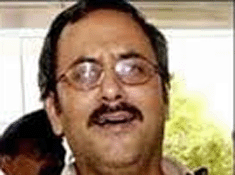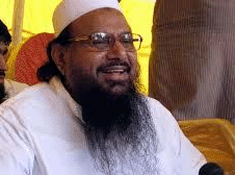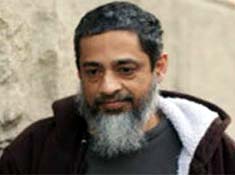Lashkar-e-Jhangvi’s co-founder to be hanged today

ISLAMABAD: The imminent hanging of the Lashkar-e-Jhangvi’s co-founder, Akramul Haq alias Akram Lahori, on January 8 (today) will effectively close a dark chapter in Pakistan’s bloody history of terrorism which was mainly directed against the minority communities, including foreigners.
Akram Lahori, the Saalar-e-Aala (commander-in-chief) of the LeJ, had co-founded the LeJ in 1996 along with Riaz Basra and Malik Ishaq, who is still the moving spirit behind Pakistan’s most lethal sectarian-cum-Jihadi group, having known al-Qaeda connections. The LeJ has an extensive network of trained operatives across Pakistan who serve as al-Qaeda’s muscle to carry out terrorist attacks in every nook and corner of Pakistan. And Akram Lahori, despite being behind bars since his June 17, 2002 arrest from Karachi, had been directing the LeJ’s terrorist activities from his prison cell where he was given access to mobile phone, television and newspapers. Akram Lahori was involved in 38 cases of sectarian killings and handed down the death sentence for the first time in April 2003 by an Anti Terrorist Court of Karachi.
According to his confessional statement, Lahori had not only killed six Iranian cadets in the garrison town of Rawalpindi on September 17, 1997 but he was also involved in the kidnapping and execution of Wall Street Journal reporter Daniel Pearl, along with Sheikh Ahmed Omar Saeed. He had also played a role in the May 8, 2002 car bombing in Karachi that killed 16 persons, including 11 French nationals belonging to the Directorate of Naval Construction who had been working in the port city. Lahori was also involved in another bombing in Karachi on June 14, 2002 when a pick-up laden with a fertilizer bomb and driven by a suicide bomber was detonated outside the US Consulate in Karachi, killing 12 people. Lahori actually became notorious when he orchestrated the murder of Iranian diplomat Sadiq Ganji in Lahore, along with Riaz Basra and Malik Mohammad Ishaq.
Just like Basra and Ishaq, Akram Lahori was also originally affiliated with the Sipah-e-Sahaba Pakistan (SSP), which he had joined in 1990. Subsequently, he, along with Ishaq and Basra, founded the Lashkar which was named after Maulana Haq Nawaz Jhangvi, the founding Ameer of the SSP. Lahori had succeeded the founding Ameer of the LeJ, Riaz Basra, after he was killed in Multan in an encounter with law enforcement agencies on May 14, 2002. He had also established a training camp in Sarobi, Afghanistan, after securing support from the erstwhile Taliban regime there. Lahori was first handed down death sentence in April 2003 by an Anti Terrorist Court of Karachi for killing a doctor. Judge Haq Nawaz Baloch convicted Lahori, Attaullah and Azim for shooting down urologist Dr Safdar Zaidi on March 4, 2002. The court also sentenced them to death for a double murder of two Shia leaders, Anwar Tirmizi and Zulfiqar Haider, who were killed on March 11, 2002 in Karachi.
The Karachi Police had released a list of the cases registered against Akramul Haq [alias Mohammad Ajmal alias Farooq Haider alias Akram Lahori] at different police stations of the port city alone. According to the list, Lahori had killed Ehteshamuddin Haider [the brother of former Interior Minister Lt Gen (retd) Moeenuddin Haider] on December 21, 2001, in the jurisdiction of Soldier Bazaar. He also killed Syed Akhter Hussain Rizvi on May 3, 2001, within the limits of Korangi police station; Dr Asad Ali Bukhari on June 26, 2001, in Saeedabad; Dr Mohammad Raza Pirani on July 18, 2001, in Soldier Bazaar; Syed Mushtaq Haider on July 20, 2001, in the jurisdiction of Brigade police station, Shaukat Ali Mirza, PSO MD and Salman Shah on July 26, 2001, in Frere area, Hamid Rizvi on Sept 1, 2001, in Clifton area, Syed Razi Haider Najfi and Basit Ali Najfi on Sept 12, 2001, within the limits of Gizri police station, Mohammad Waseem, Gulzar Hussain, Jabbar Hussain, Faizan, Ghulam Rasool and Raza Zaidi on Oct 4, 2001, in Mehmoodabad area.
Akram Lahori was also charged with the murders of Syed Jawad Hussain Rizvi, on Jan 29, 2002, in Darakhshan; Sadiq Ali Hamsheri on Feb 3, 2002, in Kharadar; Dr Rashid Mehdi on Feb 12, 2002 in the limits of Mominabad police station; Dr Aal-e-Safdar Zaidi on March 4, 2002 in the Gizri area, Dr Muzzafar Ali Samoo on March 7, 2002, in the limits of Baghdadi police station, Anwer Ali Tirmezi and Zulfiqar Haider on March 11, 2002, in the jurisdiction of Shah Faisal Colony police stationm Constable Faiz-ul-Islam on March 11, 2002, in Korangi Industrial Area; Qasim Hussain Jafery on March 21, 2002, in Mehmoodabad; Muhammad Nazeer on April 7, 2002, in Rizvia area; Abul Khair alias Asfahan Haider on April 9, 2002 in the limits of North Nazimabad police station; Aal-e-Eba Rizvi and Nasir Ali on April 24, 2002, in Peerabad; Syed Zafar Mehdi Zaidi, Mir Zaman and Mukhtar Ahmed on May 6, 2002, in the limits of Al-Falah police station; Agha Abbas and Gul Zaman on May 25, 2002, in Rizvia area and Nadeem Hussain on May 28, 2002, in Aziz Bhatti area.
Akram Lahori was also involved in a ferocious attack on the Iranian Cultural Centre in Lahore [in January 1997] which was literally burnt down by the LeJ militants. He was also involved in yet another assault on Iranian Cultural Centre in Multan, in February 1997. January 1998 saw a major terrorist attack [masterminded by Lahori] in Lahore’s old Mominpura cemetery where 25 Shias were killed, mostly women and children. This incident triggered an uproar in the country and large protests were staged which forced Pakistan to initiate a crackdown against the LeJ. As the Lahore police had arrested Aziz Gujar, Haroon Mansoor, Riaz Basra and Akram Lahori for their involvement in the Mominpura cemetery attack, Riaz Basra issued a statement announcing reward worth millions of rupees for anyone who would kill the then Prime Minister Nawaz Sharif and Punjab Chief Minister Shahbaz Sharif.
Shortly after that, the then Prime Minister Sharif had barely survived an assassination attempt when a bridge his convoy was scheduled to move across was blown up minutes before his arrival on January 3, 1999. The attack was allegedly masterminded by Riaz Basra, Akram Lahori and Malik Ishaq. The LeJ was proscribed in August 2001. Following the 9/11 terror attacks and the subsequent US invasion of Afghanistan, a new chapter of the LeJ terrorism emerged. By that time, the LeJ leadership already had established close ties with the Taliban in Afghanistan and a new alliance with al-Qaeda elements in Pakistan was in the making. The first operation conducted under the very alliance was the abduction and murder of American journalist Daniel Pearl in Karachi. Since then, the LeJ clearly seems to have grown from strength to strength to become the most lethal sectarian-cum-Jihadi group. Therefore, it is important to nip the ghost of al-Qaeda in the bud even if that means coming to grips with a part of the country’s religious clergy which continues to side with the forces of extremism.
http://www.thenews.com.pk/Todays-News-13-35130-Lashkar-e-Jhangvis-co-founder-to-be-hanged-today




